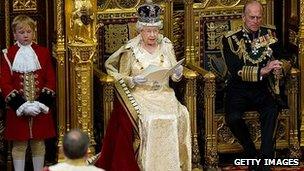What is the Queen's Speech?
- Published

The last Queen's Speech happened soon after the coalition government was formed
Written by the government and delivered by the reigning monarch, the Queen's Speech sets out the legislative agenda and is the centrepiece of the state opening of Parliament.
Each session of Parliament begins with this royal address, which usually covers the following year.
In most subsequent years it has taken place in November, but it has been moved forward to May this year, after no speech was given in 2011.
Every time there is a general election, Parliament is dissolved and the Queen's Speech takes place shortly after the government comes to power, as happened in 1997, 2001, 2005 and in May 2010.
It is intended that, in future, the speech will regularly happen in May, as, with the introduction of fixed-term parliaments, this is the month when general elections will be held.
Throne
The ceremonial trappings surrounding the speech make the event one of the high points of the parliamentary calendar, unrivalled in its spectacle and tradition despite some of the more arcane practices having been toned down in recent years.
The Queen normally attends the state opening in person and delivers the speech from the grand throne in the House of Lords.
Her speech does not set out the entirety of the government's programme, however.
The Budget and the autumn statement on the economy have also been increasingly used to set out strategy and announce new measures.
The decision over what to put in or leave out of the Queen's Speech is a politically crucial one, usually the subject of months of political wrangling within government as ministers fight for their favoured measures to win a slot in the crowded legislative agenda.
Typically a cabinet committee - which includes the leaders of the Commons and Lords, the chief whip and chief law officers - helps decide on content for the Queen's Speech, with the prime minister having the final say.
The coalition government means that negotiations are likely to have been more protracted than usual, with Conservative and Liberal Democrat ministers pushing their priorities.
The limited parliamentary timetable - and the time it takes for large bills to pass through examination by committees in the Commons and Lords - usually means not all desired measures can be included.
Delaying measures can create its own difficulties, with late bills in danger of running into the parliamentary buffers of the end of the session.
Bills which fail to pass through all their parliamentary stages by this point fall, and have to be reintroduced from scratch in the next session.
Problems
Although the government controls the parliamentary timetable through its majority in the House of Commons, several factors can derail or change its plans.
First of all, the House of Lords - whether or not it has a government majority - can reject government bills, sending them back for review to the House of Commons.
Although the government can reverse Lords decisions, the time it takes to do this can slow down progress on other parts of its programme.
In addition, the opposition can seek to delay measures. This is a tactic which can only be effective when the government has a small and unstable majority and is unable to use its "guillotine" to cut off further debate.
And the government's own backbenchers might seek to defeat the government on certain unpopular measures.
In addition to the plans set out in the Queen's Speech, the government might agree to add extra bills - including those proposed by private members who come high on an annual ballot each year - to its own programme.